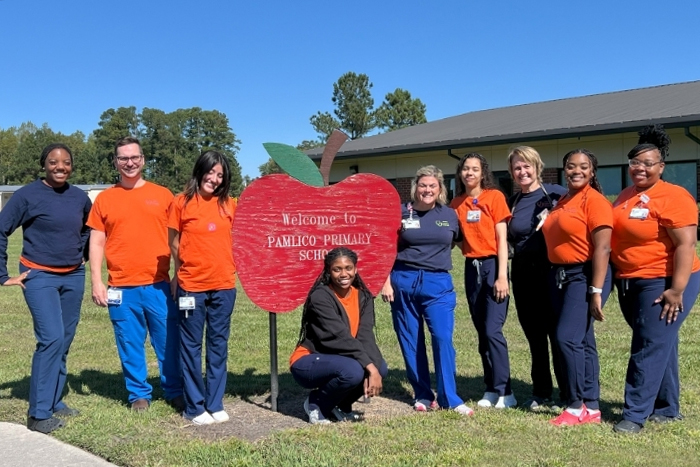Partnering to Support Rural Healthcare

Rural communities often face significant barriers to healthcare, including limited access to medical facilities, a shortage of healthcare providers, and higher rates of chronic diseases. These challenges are compounded by socioeconomic factors such as poverty and limited transportation options. Despite these obstacles, rural healthcare providers demonstrate remarkable resilience and innovation in delivering care.
Duke University School of Nursing is proud to join the nation in celebrating Rural Health Day. This day is dedicated to recognizing the unique healthcare challenges faced by rural communities and honoring the dedicated professionals who work tirelessly to improve health outcomes in these areas.
We are committed to addressing the healthcare needs of rural populations through education, research, and community engagement. Our programs are designed to prepare nurses to meet the unique needs of rural communities, emphasizing culturally competent care and the use of technology to bridge gaps in access.
“Prioritizing rural communities by building capacity at the local level to address community driven issues including access to much-needed health care is part of Duke School of Nursing’s larger effort to focus on the core values of health equity and social justice,” said Devon Noonan, PhD, MPH, FNP-BC, CARN. “Centering rural communities has been a career goal of mine and is directly in line with our mission.” Noonan is the Associate Dean for Community Engaged Science and the newly appointed Director of Rural Health Equity in the School’s Center for Nursing Research.
Much of the work that nurse scientists like Noonan are doing centers on partnering with organizations on the ground in rural communities across North Carolina. “We have worked in collaboration with providers and community organizations in rural areas to collectively improve health and health outcomes through science, testing new ways to increase the reach and access of healthcare services and programing in communities that are contextually and culturally relevant,” Noonan explained.
Duke School of Nursing faculty and students regularly partner with organizations such as Granville Vance Public Health, Pamlico County Health Department, the Hope Clinic, Granville County Schools, Aim High Keep Pressing, GRRO (Green Rural Redevelopment Organization), Mariah Parham Hospital, and the Henderson, NC branch of Rural Health Group. Collaborations might include wellness events, vaccine drives, health education sessions, and more.
One example of such a collaboration came earlier this fall, when the fourth cohort of the School’s Mobile Prevention and Care Team (M-PACT) scholars completed their immersion experience during Fall Break. M-PACT is a HRSA-funded collaborative program between the School of Nursing and Durham Technical Community College. During the immersion, the students worked with the Pamlico County Health Department, county schools, and community organizations. Among the many clinical experiences during the week, the students screened 132 children for hearing and 114 for vision. Of those screened for vision, over 36 children needed an additional vision exam and were fitted for glasses by the Durham Tech Mobile Health Unit.
M-PACT and other rural health initiatives fall under the auspices of the DUSON Community Health Improvement Partnership Program (D-CHIPP). Donna Biederman, DrPH, MN, RN, CPH, FAAN, is the director of D-CHIPP.
“Rural Americans have worse health outcomes than their urban counterparts,” Biederman explained. “Part of this is due to the lack of access to resources and care. DUSON engages with true benefits to both parties. Our rural partners provide outstanding clinical experiences for our students across our programs. Our partners receive the benefit of our students' time and expertise. Rural partnerships allow us to use innovative technology which is telemedicine equipment to increase access to care for rural residents while strengthening the clinical skills of our faculty, staff, and students engaged in these endeavors.”
Duke School of Nursing students such as postdoctoral fellow Stephanie Hart and PhD student Jill Sergison are active in rural health initiatives, while Associate Professor Mitch Knisely, PhD, RN, ACNS-BC, PMGT-BC, FAAN, recently launched a study on the feasibility of acupuncture as a pain relief in rural communities. The importance of addressing the challenges that rural communities face when it comes to accessing health care is woven into the School’s curriculum across all of our programs and concentrations.
“On National Rural Health Day we thank all our partners who are on the ground doing this work every day to improve the lives of Rural Americans and are honored to be part of the journey,” said Noonan.
M-PACT is funded by a HRSA cooperative agreement UK1HP46054